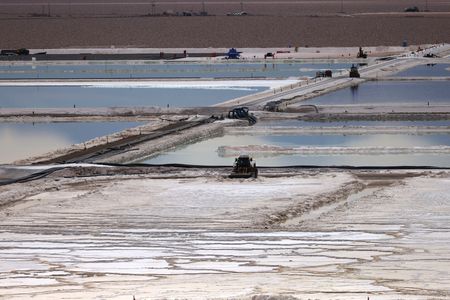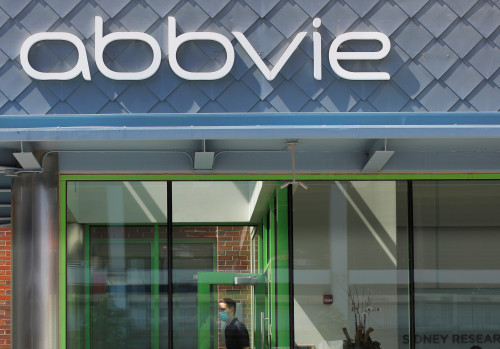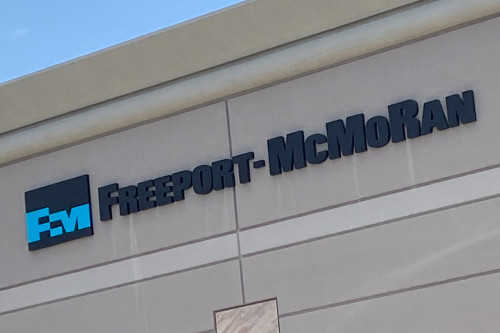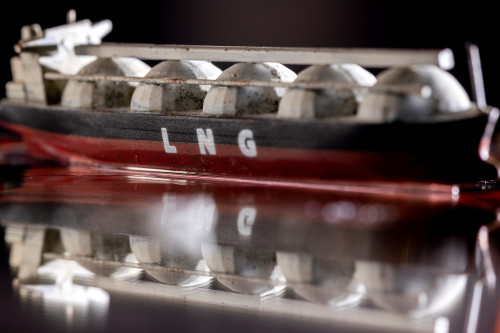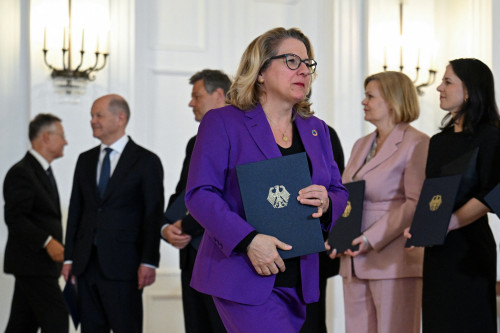By Alexander Villegas
SALAR DE ATACAMA, Chile (Reuters) – Albemarle Corp hopes to expand its lithium operations in Chile’s Atacama salt flat as early as 2028 with direct lithium extraction (DLE) technology under its current government contract, Ignacio Mehech, the company’s Chile manager, told Reuters.
“Depending on environmental and other permits needed in Chile, as well as scaling technologies, we believe (DLE) should be implemented, if everything goes well, towards 2028 or 2029,” Mehech said during an interview at the company’s Atacama lithium mining operations.
Albemarle and SQM, the only two lithium producers in Chile, currently extract the metal using mass evaporation ponds from brine taken from underground reservoirs. President Gabriel Boric has heavily pushed DLE technology. So far commercially unproven, the method could preserve water tables by allowing brine to be reinjected underground after lithium is extracted.
Even so, DLE still requires large volumes of freshwater to filter lithium from underground brine. A DLE process developed by Bill Gates-backed Lilac Solutions, for instance, uses 10 tonnes of water for every tonne of lithium produced.
Water is a hot-button topic in Chile, which is suffering a long drought, even more so on the Atacama desert. One of the driest areas of the world, mining water use there can put companies at odds with indigenous communities and threaten flamingo populations and other wildlife.
“We need to get water from other sources,” Mehech said, adding that Albemarle signed a deal with CRAMSA, a local company looking to build a desalination plant in northern Chile and infrastructure to bring desalinated water to the region.
“If more partners sign on, because our demand isn’t enough, we could secure desalinated water for the Atacama basin,” Mehech said, saying that Albemarle’s demands fulfill 500 of the 8,000 liters per second the company needs to supply the area.
When it comes to brine reinjection, Mehech said Albemarle secured environmental permits and plans to have completed a reinjection pilot program by the end of the year.
“With the results we generate from that pilot program, we’re going to start a second bigger pilot campaign to have more certainty about how reinjection should be done in the Atacama salt flat.”
This would allow the Albemarle to increase lithium production under its current agreement with Corfo, Chile’s state development agency the company has a contract with until 2043, he added.
Boric announced a sweeping plan last month to take control of the country’s lithium industry through state-controlled public-private partnerships.
Chile holds the world’s largest lithium reserves, but lost its spot as the top producer as the government failed to expand the industry.
Countries around the world are racing to provide the metal needed to power electric vehicles. Boric’s announcement spooked some investors, sparking interest in competing countries like nearby Argentina.
On Wednesday, lithium producers Livent and Allkem announced a $10.6 billion merger with a focus on Argentina.
“If you want high-quality, low-cost lithium, Argentina is the country with the best assets out there,” said Livent CEO Paul Graves.
Both SQM and Albemarle have expressed interest in expanding operations in Chile, but differ on when to start renegotiations.
SQM’s contract expires in 2030, and the company has indicated it will soon negotiate with Codelco, the state-run copper company tasked with forming the new agreements.
Albemarle CEO Kent Masters told Reuters last week he is open to negotiating before 2043 and would monitor how negotiations with SQM develop “to give us a bit of intelligence.”
Chilean Economy Minister Nicolas Grau told Reuters that conversations in the Atacama salt flat were going to be “defined during this government,” which ends in 2026, but Mehech sees a new deal happening beyond that.
“We don’t think it’s necessary. We’ve been assured by all government actors that our contract will be respected until 2043,” Mehech said.
“When it’s time, in 2038 or 2040, we’ll sit down to negotiate with the state.”
(Reporting by Alexander Villegas; additional reporting by Ernest Scheyder; Editing by David Gregorio)

